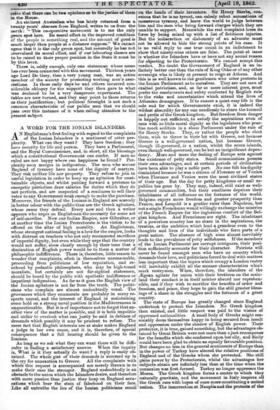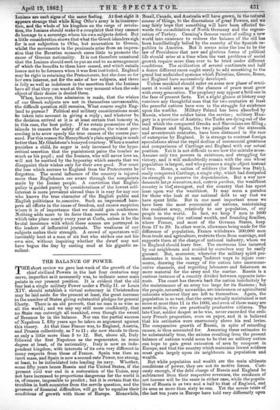A WORD FOR THE IONIAN ISLANDERS.
AN Englishman's first feeling with regard to the complaints • of the Ionian Islanders is a sentiment of utter per- plexity. What can they want? They have freedom ; they have security for life and person. They have a Parliament, and the Royal Commissioner, and, in short, all the blessings which a constitutional Government can confer. If men so ruled are not happy where can happiness be found ? Per- plexity soon merges in indignation. The men who accuse England of tyranny have none of the dignity of martyrs. They risk neither life nor property. They refuse to join in useful legislation in order to keep up an agitation for unat- tainable objects, and whilst putting forward a pretence to energetic patriotism draw salaries for duties which they do not perform, and are suspected of a readiness to sell their votes to any Government weak enough to make the purchase. Moreover, the friends of the Ionians in England are scarcely in better odour with the publiethan are the Greek agitators, whose cause they defend. Every now and then a writer appears who urges on Englishmen the necessity for some act of self-sacrifice. Now our Indian Empire, now Gibraltar, or at another time the Ionian Protectorate is the victim to be offered on the altar of high morality. An Englishman, whose strongest national feeling is a love for the empire, looks with distrust on teachers who not only recommend sacrifices of imperial dignity, but even while they urge that the country would not suffer, show clearly enough by their tone that a diminution of English power would be to them a matter of philosophic indifference. There is, therefore, little reason to wonder that complaints, ofteh in themselves unreasonable, proceeding from politicians of low reputation, and re- echoed by pedantic philosophers, who may be high-toned moralists, but certainly are not far-sighted statesmen, should be heard by the public with apathetic indifference or impatient indignation. As far as it goes the English view of the Ionian agitators is not far from the truth. The politi- cians who complain are almost undoubtedly venal. The grievances which they enumerate are probably in many re- spects unreal, and the interest of England in maintaining some hold on a strong naval position in the Mediterranean is unquestionable. But it is of importance not to forget that an- other view of the matter is possible, and it is both impolitic and unfair to overlook what can justly be said in defence of demands which possibly. it may be prudent to refuse. The mere tact that English interests are at stake makes England a judge in her own cause, ancl it is, therefore, of special consequence that a full hearing should be given to the Tomana.
As long as we ask what they can want there will be diffi- culty in finding a satisfactory answer. When the inquiry is What is it they actually do want ? a reply is easily ob- tained. The whole gist of their demands is summed up in the cry for annexation to Greece. All the complaints with which this request is accompanied are merely thrown in to make their case the stronger. England undoubtedly is an obstacle to the union which the Islanders desire, and therefore with more passion than justice they heap on England accu- sations which bear the stain of falsehood on their face. Like all untruths the lies of the lonian politicians recoil Ion. the heads of their inventors. Sir Henry Storks, con- scious that he is no tyrant, can calmly rebut accusations of monstrous tyranny, and leave the world to judge between him and the men who bring forward charges which they are unable to support. Meanwhile the real complaint loses its force by being mixed up with a list of fictitious injuries. But the indiscretion or dishonesty of an advocate must not be allowed to hide the strong points of his case. It is no valid reply to one true count in an indictment to show that ninety-nine others are false. The point at issue is whether the Islanders have or have not any sound reason for objecting to the Protectorate. We cannot accept this verdict. No doubt the Government of England is an in- finitely better one than thorule of King Otho or of any other sovereign who is likely at present to reign at Athens. And this is as well known to the gentlemen who utter protests in the Toiaien Parliament as to ourselves. They are not men of exalted patriotism, and, as far as mere interest goes, must prefer the emoluments and safety conferred by English rule to the risks and uncertainties which attend the lives of Athenian demagogues. If to ensure a quiet easy life is the sole end for which Governments exist, it is indeed the wildest absurdity for any one needlessly to share the turmoil and perils of the Greek kingdom. But freedom from danger is happily not sufficient, to satisfy the aspirations even of men with so little moral dignity as the legislators who prac- tise mock sedition in a sham Parliament under the rule of Sir Henry Storks. They, or rather the people who elect them, wish to throw in their lot with Greece, not because Greece is a well-governed nation, but because Greece, though ill-governed, is a nation, whilst the seven islands, even though well-governed, can be but an insignificant depen- dency. More and more the feeling of Europe seta against the existence of petty states. Small communities possess their own advantages, and at certain periods of civilization have been able to play a. noble part. No one felt his dignity diminished because he was a citizen of Florence or of Venice when Florence and Venice were the most civilized states of their age. But the day for petty kingdoms or small re- publics has gone by. They may, indeed, still exist as well- governed communities, but their smallness deprives their inhabitants of all influence on the fortunes of the world. Belgians enjoys more freedom and greater prosperity than France, and Leopold is a gentler ruler than Napoleon, but not a single Frenchman would willingly exchange the miseries of the French Empire for the inglorious comfort of the Bel- gian kingdom. And Frenchmen are right. The inhabitant of a powerless country has no share in the aspirations, the treaties, or the ambition which lend a grandeur even to the thoughts and lives of the individuals who form parts of a great nation. The absence of high aims almost inevitably leads to the prevalence of petty selfishness. If the members of the Ionian Parliament are corrupt intriguers, their posi- tion sufficiently accounts for their character. Patriots will never be found amongst men who have no country which demands their love, and politicians forced to deal with matters leas important than the topics which occupy a London vestry will inevitably exhibit all the meaner characteristics which mark vestrymen. When, therefore, the islanders of the .2Egean agitate for union with their brethren on the main- land their conduct is in itself neither absurd nor reprehen- sible, and if they wish to sacrifice the benefits of order and freedom, and peace, they hope to gain the still greater bless- ings of a share in the struggles and the fortunes of a great country. The state of Europe has greatly changed since England undertook to protect the Islanders. No Greek kingdom then existed, and little respect was paid to the wishes of oppressed nationalities. A small body of Greeks might rea- sonably deem themselves happy in being secured from insult and oppression under the shadow of English power. Their protector, it is true, gained something, but the advantages ob- tained by Great Britain were not more than a just recompense for the benefits which she conferred upon her ally, and Sicily would have been glad to obtain an equally favourable position. But changes no less in the general sentiments of Europe than in the power of Turkey have altered the relative positions of England and of the Greeks whom she protected. She still gains power by the Protectorate, whilst the advantages her subjects obtain are infinitely less than at the time when the connexion was first formed. Turkey no longer oppresses the Mores. The Greek kingdom forms a centre to which they naturally gravitate, and the movement in Italy inspires all the Greek race with hopes of once more constituting a united nation. The insurrection at Nauplia and the protests of the Ionians are each signs of the same feeling. At first sight it appears strange that while King Otho's army is in insurrec- tion, and the whole of his kingdom on the verge of revolu- tion, the Ionians should make it a complaint that they cannot do homage to a sovereign whom his own subjects detest. But a little consideration shows that what the Greek islanders sigh for is not subjection to Otho, but annexation to Greece, whilst the movements in the peninsula arise from an impres- sion that the Bavarian monarch cares little to promote the cause of Grecian nationality. It is not therefore unnatural that the Ionians should seek to put an end to an arrangement of which the benefits to them have ceased, and which entails losses not to be foreseen when it was first instituted. England may be right in retaining the Protectorate, but she does so for her own interest, not for the sake of her subjects, and there is folly as well as indolence in the assertion that the Ionians have all that they can want at the very moment when the sole object of their desire is denied them. When, however, this admission is made, that the wishes of our Greek subjects are not in themselves unreasonable, the difficult question still remains, What course ought Eng- land to pursue ? Political and military considerations must be taken into account in giving a reply ; and whatever be the decision arrived at it is at least certain that honesty is, in this case, the best policy. If we retain possession of the islands to ensure the safety of the empire, the wisest pro- ceedinc,c, is to avow openly the true causes of the course pur- sued. For this reason Sir HenryStork's plain speaking is much better than Mr.Gladstone's honeyed courtesy. When a master punishes a child, its anger is only increased by the hypo- critical assertion that the punishment pains the teacher as much as his pupil ; and the Ionians, who will never love us, will not be soothed by the hypocrisy which asserts that we disappoint their wishes only for their own good. Nor must the loss which accrues to England from the Protectorate be forgotten. The moral influence of the country is injured more than Englishmen are aware through the complaints made by the Ionian. people. A conviction that English policy is guided purely by considerations of the lowest self- interest is more prevalent abroad than it is easy for any one who knows the true character of the English public and English politicians to ,conceive. Such an impressiofl ham- pers all efforts in the cause of freedom, and causes suspicion where it is of importance that we should gain confidence. Nothing adds more to its force than scenes such as those which take place nearly every year at Corfu, unless it be the brutal insolence with which these scenes are portrayed in the leaders of influential journals. The weakness of our subjects makes their strength. A crowd of spectators will inevitably hoot at a man of six feet who strikes one not his .own size, without inquiring whether the dwarf may not have begun the fray by casting mud at his gigantic as- sailant.































 Previous page
Previous page